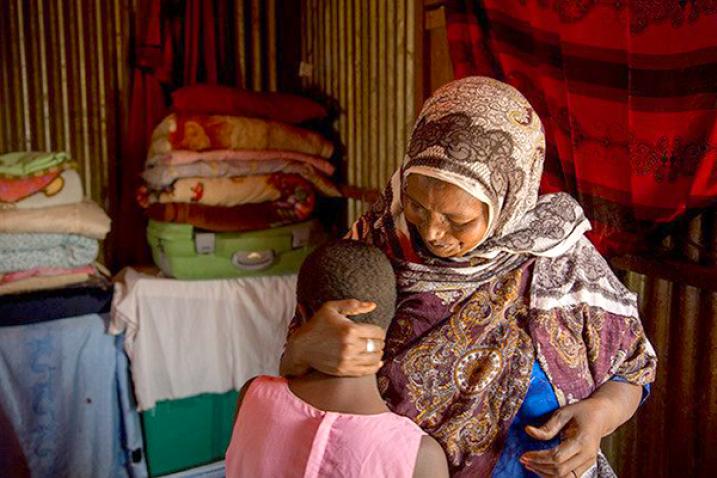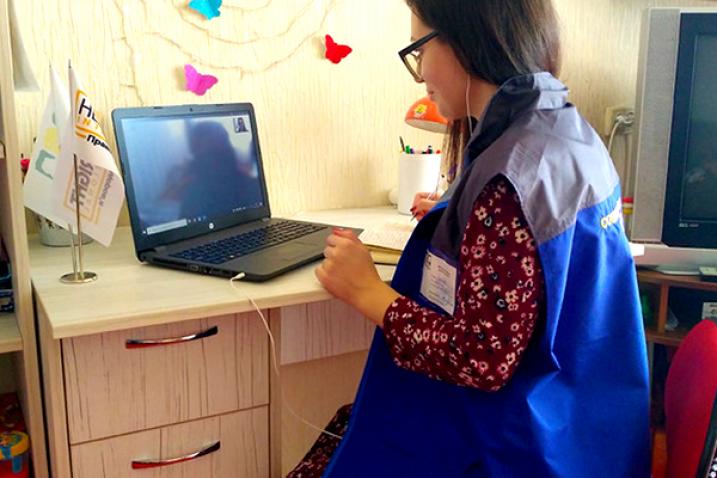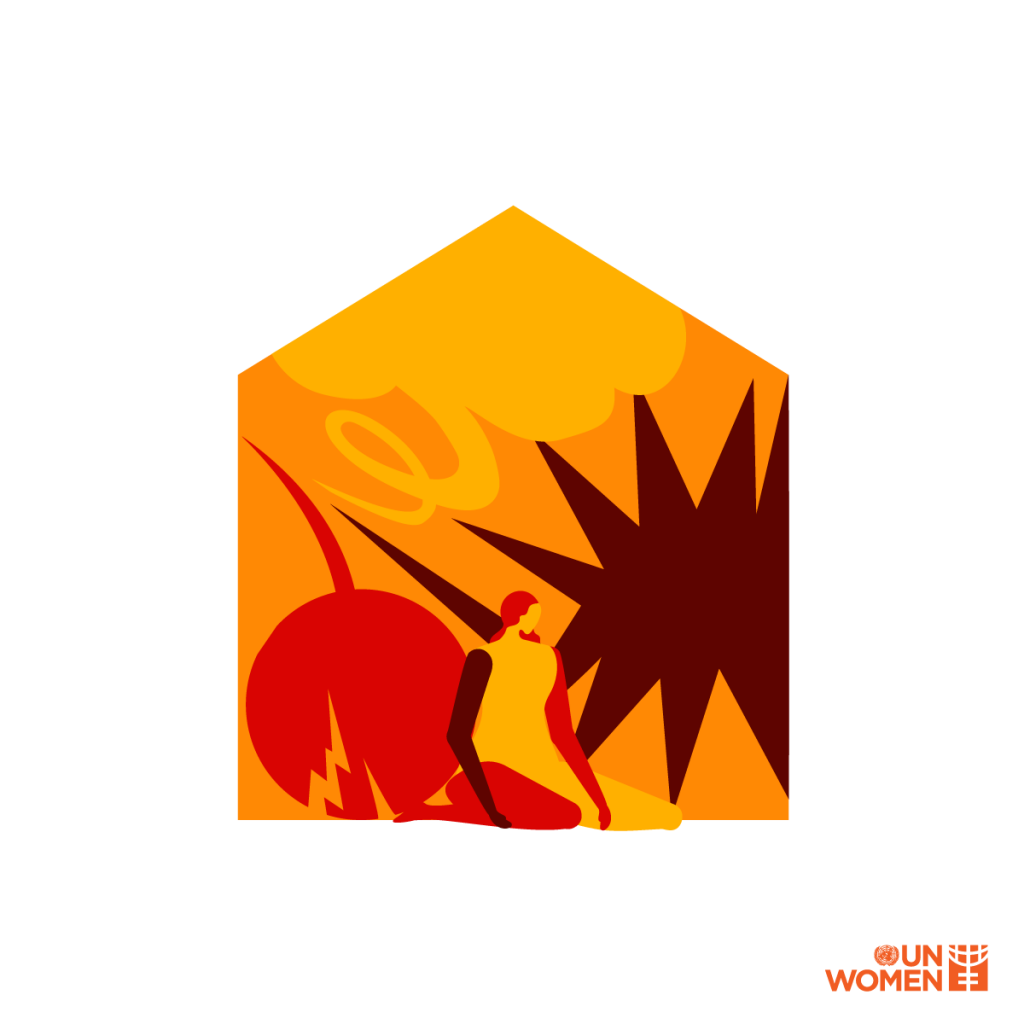
T.C.*, a Palestinian woman in Al-Bureij camp, one of the poorest and most crowded camps in the Gaza Strip, had long been verbally and physically abused by her husband. The situation took a turn for the worse under the COVID-19 pandemic, with the abuse becoming a daily occurrence.
“Sometimes I feel that this is a nightmare that I will eventually wake up from, but the nightmare is never-ending and I do not know how much longer I can handle this,” she told the United Nations Population Fund (UNFPA).
Oleksandra* says she felt the quiet war her ex-husband was waging against her had escalated under quarantine. Both living in the same apartment with their two children in Kyiv, Ukraine, she felt she had no escape from his abuse. She was afraid to seek help, knowing he might eavesdrop on her phone calls.
T.C. and Oleksandra are among the hundreds of millions of victims of violence against women and girls, which has intensified since the outbreak of COVID-19.
The United Nations Entity for Gender Equality and the Empowerment of Women (UN Women) says that domestic violence was already one of the greatest human rights violations. Some 243 million women and girls (aged 15-49) have been subjected to sexual or physical violence by an intimate partner in the last 12 months, Executive Director Phumzile Mlambo-Ngcuka wrote on 6 April.

Woman with her granddaughter. Photo: UNFPA/Georgina Goodwin UNFPA/Georgina Goodwin
“As the COVID-19 pandemic continues, this number is likely to grow,” she says. (Also see UN Women’s brief on this issue.)

Interpersonal violence rises in times of crisis
Increases in interpersonal violence during times of crisis are well documented. But wide underreporting has made response and data gathering a challenge, with less than 40 per cent of women who experience violence seeking any help or reporting the crime. Of those women who do seek help, less than 10 per cent go to the police.
However, early data shows that helplines in Singapore and Cyprus have registered a more than 30 per cent increase in calls. In Australia, 40 per cent of frontline workers in New South Wales reported more requests for help with violence. In France, domestic violence cases increased by 30 per cent since the lockdown on March 17. In Argentina, emergency calls for domestic violence have increased by 25 per cent since the lockdown on March 20.
“Unfortunately, every country in the region is already all too familiar with the scourge of interpersonal violence”, says the World Health Organization (WHO) Regional Office for Europe.

Amid a surge in calls for help, counsellors and police are pivoting to new modes of communication. Photo courtesy of Ternovyy Viktor Ternovyy Viktor
In the United Kingdom, calls, emails and website visits to Respect, the national domestic violence charity, have increased 97 per cent, 185 per cent and 581 per cent respectively. In the first 3 weeks of COVID-19 lockdowns, 14 women and 2 children were murdered in the country.
Confinement under stay-at-home orders is “a perfect storm” for violent behaviour behind closed doors, says Ms. Mlambo-Ngcuka, as it exacerbates tensions about security, health, and money.
Peace is not just the absence of war. Many women under lockdown for #COVID19 face violence where they should be safest: in their own homes.
Today I appeal for peace in homes around the world.
I urge all governments to put women’s safety first as they respond to the pandemic. pic.twitter.com/PjDUTrMb9v— António Guterres (@antonioguterres) April 6, 2020
In his message, UN Secretary-General António Guterres said that for many women and girls, the COVID-19 threat looms largest where they should be safest – their own homes. “We know lockdowns and quarantines are essential to suppressing COVID-19,” he said. However “they can trap women with abusive partners.”
He urged all Governments to make the prevention and redress of violence against women a key part of their national response plans. Over 140 Governments have supported this call.

Mobile psychosocial team members say they have seen many more calls for help. Photo courtesy of Maryna Hlushchenko Maryna Hlushchenko
A need for silent and safe services
In addition to exacerbating fear, anxiety, financial stress and alcohol consumption, COVID-19 has challenged the ability of health and social services to connect with and support victims of violence. In response, countries are putting in place solutions to offer safety.
In Ukraine, Tetyana Franchuk, a psychologist with a UNFPA-supported mobile psychosocial team in Vyshneve, near Kiyv, has been providing services via Skype, Viber, Zoom and phone since the quarantine started. These new platforms have become popular.
“Now some clients even tell us that this way of work is more suitable for them than visiting us, and they want to continue in such way even after quarantine ends,” she says.
In Norway, too, teachers and other child welfare service workers have gone mobile, prompting more direct follow-up measures with known vulnerable children.
In France, Germany, Italy, Norway and Spain, pharmacies and supermarkets have become safe “go-to” spaces where the utterance of a codeword (“MASK 19”) signals an urgent request for protection from domestic abusers. These locations are often the only retailers open, and shopping for essential groceries is the only accepted reason for people to leave their homes.
With shelters at peak capacity in many of these countries, hotels have been re-tasked to meet the shortfall in emergency accommodation.

